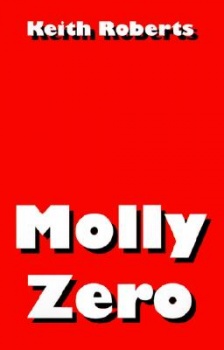Molly Zero (1980) is a very odd book. I’m delighted to see it’s in print—Wildside are a print-on-demand small press doing excellent work. Molly Zero set in a dystopian future Britain. It’s the story of a girl, the eponymous Molly Zero, who grows up in the Blocks, surrounded by other children, staff members, and computers, never seeing anything beyond very limited horizons. She’s also constantly tested. At six years old she has to choose between “Red is good, green is bad” and “Green is good, red is bad”. Children who make wrong choices disappear, just gone, their beds are empty in the morning. Then at sixteen Molly escapes and finds the country cut into enclaves, living as if it’s the 1950s except for some oddments of much higher technology. She lives with ordinary people, travels with gypsies, and joins a terrorist group trying to change things. The reader and Molly slowly learn about the world and what’s happened to it, and what’s expected of her.
The oddest thing about it is that it’s written in second person present tense:
You’re shivering inside your coat. It’s a nice coat, brand new, an olive green mac. Belt cinched tight and collar turned up, very military. It makes you look good, but it can’t stop the shakes. You drive your fists deeper into the pockets and hunch your shoulders. You tell yourself there’s nothing to worry about, it’s only Decentralization, it happens to everybody. But that doesn’t help much either. You’re Molly Zero and you’re scared to death.
If you hate that paragraph, you’re going to hate the book, because it’s all like that. I know some people read a sentence like that and say “No I bloody don’t!” Roberts was one of the British New Wave writers, and much of his work consciously experimented with style. This second person thing could be a gimmick, but it isn’t, it has an actual purpose, though you don’t find that out for a long time. I don’t generally care for this kind of thing, and really Molly Zero and “Story of Your Life” are the only things I can think of where it works for me. Molly Zero would be a very different book in either first or third person, and if you’re interested in writing it can be quite instructive to turn a couple of paragraphs of this into a different person and see how much it changes the emotional tone. Keith Roberts told me in conversation in 1988 that he started writing it in second person because he had the initial idea for it as a film, all visuals and external, and he’d imagined that was how films were written. Then once he got going he saw what he could do with it and couldn’t imagine it any other way.
The questions raised about the world are intriguing, and if the answers are deeply implausible, this isn’t all that unusual in a dystopia. (Even in 1980 I think we knew planned economies had problems.) The book is at its best when we see Molly fitting herself into a context—and indeed she can be content almost anywhere, but truly happy nowhere. In the Blocks, in Seahaven making corn dollies, with the gypsies, even with the terrorists, she finds people to love and small things to treasure. We see enough of these worlds through Molly’s eyes to appreciate them as that very British form the pastoral dystopia. And we learn a lot about Molly too, even in second person, and even though she’s so passive, always stirred to action by somebody else.
World spoilers: If this was an ordinary book it would be about Molly finding out that the Blocks are at attempt to fix “Quis custodiet” by bringing children up to become elite decisonmakers to run the country, perhaps with an additional twist of asking the reader to question whether it’s a good idea—the way The Price of Spring makes the reader realise the harshness of the system in A Shadow in Summer was in fact justified, or for that matter, Cyteen. But while Molly does find that, by the time she does she’s been so manipulated (everything has been manipulation and forced choices) that she has become entirely dissociated—towards the end of the book the second person has become dreamlike and weird as Molly loses her centre. I think the earlier parts of the book could have been written in some other form, but because you’ve been eased into it and become used to it, the end can take you in unexpected directions. There isn’t an instant where you think it was a good idea, or even faintly justified, and their reasoning is completely bonkers.
Still, it’s a story not a political tract, and as a story there’s a lot to recommend it. Once you get used to the odd second person, it’s very readable, the characters (as always with Roberts) are great.
Jo Walton is a science fiction and fantasy writer. She’s published eight novels, most recently Half a Crown and Lifelode, and two poetry collections. She reads a lot, and blogs about it here regularly. She comes from Wales but lives in Montreal where the food and books are more varied.










